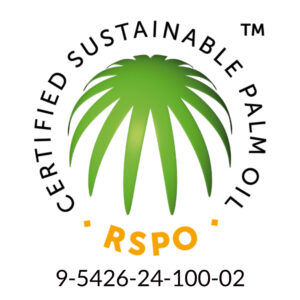Palm Oil is the world’s most important vegetable oil. In 2015 approximately 59 million tons were produced on 17 million hectare farm ground. Largest producers are Indonesia, Malaysia, Columbia and Nigeria, whereas, largest importers are India, the EU and China. The oil palm (Elaeis guineensis) grows in wet tropical regions. Tropical rainforest is slashed and burned to clear the land for monocultures of oil palm plantations leading to substantial carbon dioxide emissions. Rare animal and plant species are threatened to extinction. Local indigenous communities are dislodged from their native land, workers are forced to work without proper protection from aggressive pesticides at a minimum wage and without the possibility to form unions. These are just some of the grieve consequences that the global thirst for palm oil is causing.
On the other hand, avoiding palm oil completely cannot be the answer: Oil palms have by far the highest yield among oil crops. Changing to another plant oil would require even more farm land to produce the same amount of oil. Palm oil and palm kernel oil have various beneficial properties that make their use so interesting for food, personal and home care, pharmaceutical and chemical industry and in animal feed. In the EU, the largest amount of palm oil is however used for bioenergetic purposes, e.g. as biofuel.
answer: Oil palms have by far the highest yield among oil crops. Changing to another plant oil would require even more farm land to produce the same amount of oil. Palm oil and palm kernel oil have various beneficial properties that make their use so interesting for food, personal and home care, pharmaceutical and chemical industry and in animal feed. In the EU, the largest amount of palm oil is however used for bioenergetic purposes, e.g. as biofuel.
All these complex aspects led to a social and environmental awareness of consumer and demand for sustainable sourcing arose. Established in 2004 by several international organizations alongside the supply chain, the Roundtable on Sustainable Palm Oil (RSPO) is now one of the leading bodies in the oversight of the production and trade of sustainable palm oil. Plantation owners, miller, refiners and other industry partners, traders, banks but also small independent cooperatives as well as environment and social activist groups are members. Their aim is transparency and an open dialogue on how to protect the environment and workers’ rights. They established standards for the certification of the production of palm oil and for the traceability of the derivatives.
These supply chain models exist
Four different Supply Chain models are established:
- Book and Claim (B&C)
- Mass Balance (MB)
- Segregated (SG)
- Identity Preserved (IP)
In order to trace an oil palm derivative back to the farm, a MB, SG or IP Supply Chain Certification System (SCCS) is required.  The Book and Claim system allows the producers to physically separate product and certificates and sell them independently. A traceability is not possible. While in the Identity Preserved system only one certified producer delivers the crop to one certified miller and refiner, the Segregated system is open for more than one certified producer or miller to combine their palm derivatives. In both cases the mixing with uncertified palm oil is prohibited. In the Mass Balance system certified and non-certified palm oil can be mixed, but the amount of certified palm oil must be monitored constantly. The MB SCCS is an administrative system: There are no physical differences between the certified and non-certified product.
The Book and Claim system allows the producers to physically separate product and certificates and sell them independently. A traceability is not possible. While in the Identity Preserved system only one certified producer delivers the crop to one certified miller and refiner, the Segregated system is open for more than one certified producer or miller to combine their palm derivatives. In both cases the mixing with uncertified palm oil is prohibited. In the Mass Balance system certified and non-certified palm oil can be mixed, but the amount of certified palm oil must be monitored constantly. The MB SCCS is an administrative system: There are no physical differences between the certified and non-certified product.
As a manufacturer of natural cosmetics ingredients, for Cosphatec it is important to support sustainable palm oil production. Since October 2016 the Cosphatec GmbH is an associate member of the RSPO and complies with the intent and requirements of the RSPO SCCS.
Check our progress at www.rspo.org